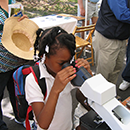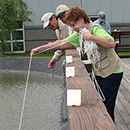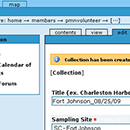Phytoplankton Monitoring Network
Phytoplankton Monitoring Network (PMN).docx
Generic Clearance for Citizen Science and Crowdsourcing Projects
Phytoplankton Monitoring Network
OMB: 0648-0828
Home > Science Areas > Stressor Impacts and Mitigation > Phytoplankton Monitoring Network (PMN)
Phytoplankton Monitoring Network (PMN)
Better Understanding of Harmful Algal Blooms Through Volunteer Monitoring
https://coastalscience.noaa.gov/science-areas/stressor-impacts-mitigation/pmn/
The National Phytoplankton Monitoring Network (PMN) is a community-based network of volunteers monitoring marine phytoplankton and harmful algal blooms (HABs). PMN recognizes the interrelationships between humans and coastal ecosystems while providing volunteer citizen scientists with meaningful opportunities for hands-on science engagement. The PMN enhances the Nation’s ability to respond to and manage the growing threat posed by HABs by collecting important data for species composition and distribution in coastal waters and creating working relationships between volunteers and professional marine biotoxin researchers.
Learn more about the PMN program goals, history, and staff.
Information and tools for new and current PMN volunteers.
Submit current data collections and view historical data.
Plankton images collected in the field as well as volunteer pics.
NCCOS delivers ecosystem science solutions for stewardship of the nation’s ocean and coastal resources to sustain thriving coastal communities and economies.
Example for ATLANTIC REGION 1 DATA ENTRY
PMN ATLANTIC REGION 1 DATA ENTRY
New Hampshire, Massachusetts, Rhode Island, Connecticut, New York
Draft saved
* Required
Email*
If you do not see your PMN ID or site name listed, please exit data entry form and contact PMN for activation. Email: [email protected]
Please choose your PMN ID from the list below:*
MA51
Next
Page 1 of 30
Clear form
Never submit passwords through Google Forms.
PMN ATLANTIC REGION 1 DATA ENTRY
Draft saved
* Required
MA51 sites
*
Town Pier
PMN ATLANTIC REGION 1 DATA ENTRY
[email protected] Switch account
* Required
Sample data- Atlantic Region 1
New Hampshire, Massachusetts, Rhode Island, Connecticut, New York
Date sample was collected*
Click arrow below to view calendar or enter date as MM/DD/YYYY
Date
Time collected*
Please be sure to indicate AM or PM using drop down box
Time

:

AM
Water Temperature (Celsius)*

Your answer
Air Temperature (Celsius)*

Your answer
Salinity (ppt)*

Your answer
TARGET SPECIES*
Please check one box for each line (will stay highlighted as pink until all lines have a check mark)
None
YES (1 cell up to ~60% of slide coverage)
Elevated (>60% slide coverage)
Akashiwo sanguinea
Alexandrium spp.
Ceratium furca
Chaetoceros spp.
Cochlodinium spp.
Dinophysis spp.
Prorocentrum spp.
Pseudo-nitzschia spp.
Akashiwo sanguinea
Alexandrium spp.
Ceratium furca
Chaetoceros spp.
Cochlodinium spp.
Dinophysis spp.
Prorocentrum spp.
Pseudo-nitzschia spp.
OPTIONAL DATA- Although the following information is all optional, each question requires a response. Please leave NA as your response if you do not have data.
WEATHER*
Sunny
Partly cloudy
Mostly cloudy
Cloudy
Rain
NA
Wind direction*
N
NE
E
SE
S
SW
W
NW
NA
Wind speed*
0-5 MPH
5-10 MPH
10-15 MPH
15-20 MPH
25+ MPH
NA
Tide*
Incoming
Full high tide
Outgoing
Dead low tide
NA
For the following items, please leave NA if you do not have data. Each line must have either a numerical value or NA to be valid.
Please convert your values for dissolved oxygen, barometric pressure and secchi depth to the units listed if necessary.
pH*

Dissolved oxygen (ppm)*

Barometric pressure (mmHg)*

Secchi depth (cm)- please convert from (m) to (cm)*

Please check any of the following groups that you may have also observed and the relative abundance of each. If you don't know/can't ID, please leave NONE as response for each group.*
None
Yes
Elevated
Centric diatoms
Pennate diatoms
Dinoflagellates
Cyanobacteria
Zooplankton
Centric diatoms
Pennate diatoms
Dinoflagellates
Cyanobacteria
Zooplankton
Which single group of organisms was the MOST dominant overall on your slide? If you're not sure or don't know, please leave NA as your response.*
Centric diatoms
Pennate diatoms
Dinoflagellates
Cyanobacteria
Zooplankton
NA
Please indicate any phytoplankton you can identify by name and its relative abundance. If you're not sure/can't ID, please leave all boxes empty.
YES (1 cell up to ~60% of slide coverage)
Elevated (>60% slide coverage)
Skeletonema
Coscinodiscus
Odontella
Ditylum
Navicula
Nitzschia
Asterionellopsis
Thalassiosira
Thalassionema
Protoperidinium
Rhizosolenia
Eucampia
Hemiaulus
Triceratium
Pleurosigma
Guinardia
Licomorpha
Leptocylindrus
Bacillaria
Skeletonema
Coscinodiscus
Odontella
Ditylum
Navicula
Nitzschia
Asterionellopsis
Thalassiosira
Thalassionema
Protoperidinium
Rhizosolenia
Eucampia
Hemiaulus
Triceratium
Pleurosigma
Guinardia
Licomorpha
Leptocylindrus
Bacillaria
If you can identify other phytoplankton not listed above, please write in name(s) below. If not, please leave NA.*

Please indicate any zooplankton/other you can identify by name. If you're not sure/can't ID, please leave NA as your response.*
Nauplius
Zoea
Copepod
Tintinnid
Ciliate
Rotifer
pollen
NA
Other:

Do you have any PHOTOS? Send to [email protected]*
Do you have any photos to send? Remember, if possible, you should be taking photos of all target organisms (and any unknowns) for confirmation purposes. You can make a single PDF of all photos labeled with IDs, a PowerPoint presentation of all photos labeled with IDs, or send as individual image files labeled with IDs. Please email photos to [email protected]
Yes
No
Any final observations or comments?*
Please enter any additional observations you may have (water color, smell, other organisms seen, etc) using the "Other' response.
NO
Other:

PLEASE take a moment to review your data entry above for accuracy. "NO" will allow you to review your entries. Once submitted, it cannot be edited but must be re-entered. If re-entered, please type "Correct data" in comments section.*
ARE YOU READY TO SUBMIT YOUR DATA?
Yes
No
| File Type | application/vnd.openxmlformats-officedocument.wordprocessingml.document |
| Author | Joe.I.Terry |
| File Modified | 0000-00-00 |
| File Created | 2023-12-18 |
© 2026 OMB.report | Privacy Policy




